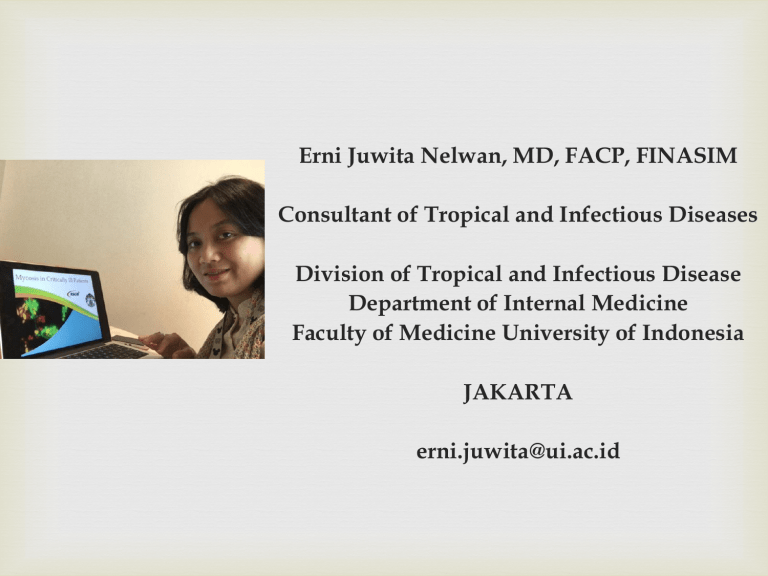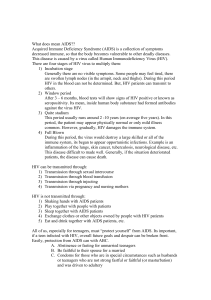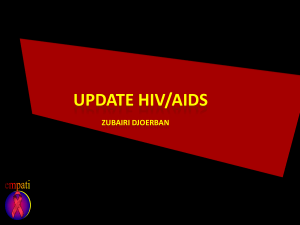Erni Juwita Nelwan, MD, FACP, FINASIM Consultant of Tropical and
advertisement

Erni Juwita Nelwan, MD, FACP, FINASIM Consultant of Tropical and Infectious Diseases Division of Tropical and Infectious Disease Department of Internal Medicine Faculty of Medicine University of Indonesia JAKARTA [email protected] Erni Juwita Nelwan Divisi Tropik dan Penyakit Infeksi Departemen Ilmu Penyakit Dalam FKUI / RSCM Immunonutrisi Intervensi nutrisi yang dapat memodulasi sistem imun Outline Pengaruh infeksi HIV/AIDS pada status gizi Pengaruh malnutrisi pada infeksi HIV Defisiensi mikronutrien pada infeksi HIV Komponen tatalaksana nutrisi Metabolisme Gizi pada ODHA Asupan gizi tidak adekuat (gangguan kognitif/depresi, poverty, anorexis, nausea, jamur mulut ) Memperburuk status gizi (Malnutrition) Depress antibody production, the function of phagocyte cells, and levels of complement. Absorption of amino acids GIZI & HIV Gizi terganggu Kebutuhan zat gizi meningkat HIV Resiko terhadap penyakit infeksi meningkat sistem imun menurun EFEK HIV PADA GIZI Infeksi sekunder berulang Anoreksi a Diare berulang Multifarmasi Kebutuhan energi meningkat Kebutuhan nutrisi meningkat Malabsorbsi HIVGIZI Respon peradangan Stages of HIV Disease and Nutrition Specific nutrition recommendations vary according to the underlying nutritional status and extent (stage) of HIV disease progression The disease progression may be categorized into three stages: Early (I): no symptoms, stable weight Middle (II/III): significant weight loss Late (IV): symptomatic, full-blown AIDS disease 12 Early Stage (I) No symptoms, stable weight Increased nutritional requirements during HIVinfection Energy increase: 10 - 15% Protein increase: ~ 50% Vitamins and minerals used by the immune system are also increased Main objective: remain as healthy as possible 13 Build stores of essential nutrients Identify locally available and acceptable foods Maintain weight and lean body mass, preserve muscle mass, and increase energy Adequate diet Maintain physical activity Middle Stage (II/III) Significant, unintentional or undesirable weight loss as a result of opportunistic infections Main objective: minimize consequences Increase nutrient intake for recovery/weight gain Maintain intake during periods of acute illness and depressed appetite Increase nutrition intake gradually to promote weight and muscle mass gain, and nutritional recovery Make every bite count Daily vitamin-mineral supplements Continue physical activity as able 14 Late Stage (IV) Symptomatic, full-blown AIDS disease Main objective: provide comfort or palliative care Treat all infections that affect intake Modify diet according to symptoms Maintain intake during periods of acute illness and depressed appetite Encourage eating and physical activity as able Provide psychological and emotional support 15 HIV dan Malnutrisi Kejadian HIV dan malnutrisi tinggi di berbagai negara (~ wasting) Malnutrisi: Mempercepat progresivitas infeksi HIV Infeksi HIV menurunkan status nutrisi Malnutrisi: Primer (intake tidak adekuat) Sekunder (gangguan metabolisme dan penyerapan makanan) Mikronutrien Defisiensi Banyak ditemukan pada penyakit infeksi termasuk HIV Difficult to measure (hidden hunger) Contoh defisiensi mikronutrien: Zat besi anemia Iodine gangguan tiroid Vitamin A Vitamin D REKOMENDASI GIZI Manifestasi Klinis Gangguan Gizi Rekomendasi Gizi Anoreksia Penurunan nafsu makan, kesulitan menelan karena infeksi jamur mulut (kandidiasis oral). makanan lunak, porsi kecil dan sering, minum menggunakan sedotan. Diare Kehilangan zat gizi dalam tubuh rendah serat, lemak, dan banyak mengkonsumsi cairan, buah-buahan tinggi kalium dan magnesium : pisang REKOMENDASI GIZI Manifestasi Klinis Gangguan Gizi Rekomendasi Sesak Nafas Asupan kalori tidak mencukupi, pasien lemah Makanan diberikan dalam posisi setengah tidur Malabsobsi Lemak Gangguan penyerapan lemak sumber lemak nabati Demam Peningkatan pemakaian kalori dan kehilangan cairan minum lebih dari 2 liter/ hari (`bb) BB turun Gangguan makan secara oral Tinggi kalori protein, padat kalori,rendah serat, porsi kecil dan sering The Vicious Cycle of Malnutrition and HIV • Insufficient dietary intake • Malabsorption, diarrhea • Altered metabolism and nutrient storage • Increased HIV replication • Hastened disease progression • Increased morbidity Nutritional deficiencies • Increased oxidative stress • Immune suppression 21 Key Points HIV can lead to malnutrition by multiple mechanisms Malnutrition is associated with increased HIV transmission, progression, and mortality Nutritional supplementation is associated with improved HIV-related outcomes 22 Key Points (2) Maintaining adequate nutrition prolongs well-being of HIV-infected persons but is difficult HIV affects nutrition in three, sometimes overlapping, ways: Reduces amount and type of food consumed Interferes with the digestion and absorption of nutrients Alters metabolism of nutrients 23 Key Points (3) Counseling and other interventions to prevent or reverse weight loss are likely to have their greatest impact early in the course of HIV infection Nutritional care and support should be part of a comprehensive program that deals with the needs of the patient and his or her family Nutritional supplements, particularly antioxidant vitamins and minerals, may improve immune function and other HIV-related outcomes, particularly in nutritionally vulnerable populations 24 Key Points (4) Managing common symptoms related to HIV/AIDS such as diarrhea, nausea, and loss of appetite, can minimize their impact on nutritional status Prevention of food- and water-borne infections reduces the risk of diarrhea, a common cause of weight loss, malnutrition and HIV disease progression in people living with HIV and AIDS Continuing physical activity and exercise, as appropriate, increases energy, stimulates appetite and preserves and builds lean body mass 25

